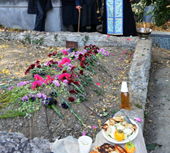
Ekaterina, dying of cold in the midst of plenty: a Tragedy of the Elderly in Tbilisi
M.E.Chatwin
Monday, February 10
When I first met Ekaterina last year, she was standing and staring at sausage meat in the neighborhood market, and I was buying cheese at the same counter. She asked the shop attendant how much it was then remained silent. I asked her in broken Georgian, “Would you like some?”
Her face brightened. “Yes,” she answered. She stood in her modest dress, with her cane, and instructed the shopkeeper to give her a good piece of the processed meat then we bought bananas and bread. Spasiba, she said, and hobbled slowly back across the street to her rambling old house on the corner of a busy Mtatsminda neighborhood street. I thought nothing of the encounter until I realized she spotted me several times going into the shop, and crossed the street to meet me in the store. She was obviously destitute but proud—yet each time we picked out yogurt, sausage, or a khachapuri.
One day when passing her gate I saw an ambulance-- neighbors stood around, and I asked what had happened. “Ekaterina’s sister Nadia is being taken to hospital.”
“Sister?” I hadn’t realized there was another elderly woman—also in her 80s—hidden away, living in the same house! Nadia had fallen and broken her hip two weeks before--but no one had taken her to hospital and she’d lain in bed with a broken hip for 15 days! It was night but I called a doctor who sent his assistant to examine her (by flashlight-- as they had no electricity). The next day new xrays were made and Nadia was hospitalized for a hip replacement--free of charge. She returned home, now an invalid for her older sister to care for. Ekaterina turned away the NGOs offering to help, embarrassed for anyone to see the squalor of her conditions, yet the Georgian Association of Social Workers helped create a plan for the sisters, and they were signed up for free meals in a nearby social food kitchen.
The two had always lived alone - their mother died when they were young, and neither girl had married. They had also had a brother and a father who had supported them and taught them to be discrete about their lives and misfortunes. They rarely talked of being needy, however. After World War II their father had gone to bring his son’s body home, but the Russians refused to give his son back, and he came back to Tbilisi to mourn, a broken man, until he died—leaving the two girls alone for 60 years-- most of their lives in the home he had built for his family. He had been a mason and woodworker, and each part of this immense wooden structure he built himself as a labor of love. Gradually the lands he owned on the street were sold off; the first floor is empty--it’s hard not to notice a rat scurrying away into the ivy that has overgrown the yard. This Vera property is likely worth millions but the elderly survivor knows nothing of it.
For fifty years, the two women became more isolated, and it was Ekaterina who fended for herself and her sister. There is still no toilet indoors, no gas, a petchi without wood, no refrigerator, and not even a railing down the outside stairs. Ekaterina holds onto the branches of a spindly tree by the door to get down the steps, feeling for the next step with her cane, so she can get water from the faucet. But the faucet is frozen now and her container of water in the house is frozen too.
An International Conference on elderly care was held last year in Tbilisi on the 28th and 29th of May, organized by the Samaritan organization of Georgia SSK. International experts and Georgian NGOs discussed approaches to care delivery with Municipal authorities and the Ministry of Labor, Health and Social Affairs…Financial schemes for social services were important parts of the Conference decisions, yet it is unsure how that has translated into the everyday existence of isolated older persons. Today almost 20,000 elderly are offered meals in centers around the city; in Ekaterina’s neighborhood almost 800 are served. But the elderly cannot always access the center and if no one in the family offers to step forward and deliver the meal, and then they will have nothing-- sometimes for days.
A few months ago, Nadia died and was buried in the Vera Cemetery next to her parents. Ekaterina goes to visit the grave each morning. The social services stopped coming after Nadia died, but Ekaterina could still pick up food from the local food kitchen.
Last week the streets were frozen — the Traumatology Hospital in Dighomi is still working overtime and in crowded conditions, as victim after victim is brought in for broken bones. Falling on Tbilisi’s icy sidewalks can be a death sentence for those with frail bones—it is a war zone for the elderly. Drivers are offered de-iced streets for the glut of cars and buses. However accessible sidewalks for vulnerable pedestrians are not on the agenda of the Municipality. Cars park on sidewalks and even businesses spill out to take over public spaces, forcing pedestrians into the dangerous streets.
During the freezing weather last week Ekaterina was afraid to venture out and remembered her sister’s tragedy after she fell. Ekaterina still has no heating, no water, no electricity, no gas and no indoor toilet. She mainly stays in her bed under the sabani to survive the sub-zero temperatures. Her only relatives, a nephew’s family, live in Vake , but they rarely come see her, nor worry whether the elderly woman is alive…the wind whistles into her bedroom through broken window panes, the bed sags and there is no one to bring food or wash clothes. The petchi stands cold in the sub-zero winter--no one brings wood.
When I drove by her house last week I stopped to see if she had heat or food. The insides of the window to the street were frosted over. I stood in the street and knocked on a window. Ekaterina came, wearing a cotton dress and an old wool sweater, a wool hat on her head. Her bare hands were bright red with frostbite as she wrung them together to keep warm; her whole body shook--she couldn’t stop trembling. I asked how long it had been since she’d taken food from the street below—“Five days”. For five days she hadn’t eaten! I saw the only water she had, in an open container, was frozen solid.
“It’s been too cold and I ‘m afraid on the sidewalks,” she explained as we went by car to the food kitchen a block away, down a steep road. Her plastic containers had no lids, yet the food kitchen filled the containers with no covers and gave them back so that once we arrived back at her gate, I was surprised by the liquid food that suddenly gushed to the ground through a hole in the plastic bag-- hot oatmeal and a portion of rice-- soaking the only bread she’d have for days. Social service in Tbilisi is not customer service…
The Municipality accepts no responsibility for taking food to isolated invalid elderly in subzero temperatures, or for supplying them with heating. The elderly are not encouraged to ask for warm clothes or sufficient health care unless an emergency is announced. Ekaterina isn’t the only extremely vulnerable senior citizen in Tbilisi—there are hundreds who live isolated and dying. Will her wealthy relatives be glad to see their cranky, proud aunt disappear and leave her valuable property? Who would care about a lone 80–year-old in subzero temperatures who has mourned all her family and defended her house, her family’s reputation and tended to a bed-ridden sister? Not her relatives. The myth of Georgian families taking care of each other is often just that—a myth. Now this tired and elderly warrior is hungry, alone and cold --her life is constantly threatened. How many in Tbilisi are likewise ignored by neighbors and relatives --and by Municipal services that should be offering much more to provide a safe environment for the survival of the most vulnerable in the city?


